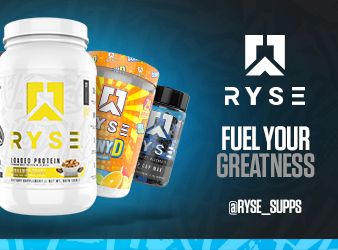Before I discuss carbohydrates, I need to first establish the fact that our bodies were designed to burn carbs for fuel. Or, to be more precise, glycogen. Now, I fully admit the previous statement is by no means earthshattering. Furthermore, it’s something you’d find in almost any biology textbook or Wikipedia article on the subject. However, based on some of what I see these days with regards to athletic performance nutrition, you’d think some “gurus” have either forgotten about the body’s need for glycogen, or they are willingly ignoring it to push the latest fad diet scheme.
From carbohydrate foods simply lying on our plate, all the way to running our biological motors, the process of fuel harvesting, processing, storing, utilizing, and waste disposal must be kept seamless and consistent. That is…if you are after maximum performance, growth potential, and recovery. In short, our bodies were not designed to have this production line stopped for an undetermined amount of time, only to be restarted randomly at some point in the future. That’s just my fancy way of referring to certain popular diet protocols and methodologies that call for such an application.
To put it very bluntly and succinctly, we were designed to want carbs. In fact, the first enzyme that greets whatever goes into our mouths is called amylase— it converts starch and glycogen into simple sugars—because our human bodies are expecting carb-laden foods.
Our body needs specific foods to give us maximum energy output and keep all of our essential functions in motion. This is a very big deal for athletes. The ultimate objective of the body is to produce and utilize adenosine triphosphate (ATP), a high energy molecule that fuels the mitochondria. In turn, it runs all of our major biological processes. In case you were not aware, your cells convert carbohydrates into ATP through a process called cellular respiration. While our bodies can do this with certain fats, carbohydrates are the most preferred and most efficient source.
Now with that in mind let’s review another basic fact about carbohydrates: its two basic classes—simple and complex. Simple carbohydrates are made up of 1 to 3 sugar molecules linked together. Complex carbohydrates, however, are actually large chains and branching structures made up of simple sugar molecules. Simple carbohydrates are rapidly absorbed and enter the bloodstream very quickly. Conversely, complex carbs are digested more slowly because the enzymes must attack highly complex structures to convert back down to simple carbs. Due to this prolonged process, complex carbs provide sustained energy release.
Carbs are almost exclusively the main source of energy for the brain. Similarly, glucose is the major fuel for muscle. Muscles desperately need to maintain large stores of glycogen. Without it, there isn’t anything the body can rapidly convert into glucose 6-phosphate for bursts of rapid activity.
Let’s now discuss when the best times are to eat carbohydrates to fuel your workouts, not to mention which sources are the best.
Pre-Workout Timing & Preferred Carb Sources
As a pre-workout meal, it wouldn’t make sense to eat any type of complex carbs within an hour of training. Actually, your last complex carb meal should be 2-3 hours prior to training. This meal could include such things as rice, potatoes, or pasta. If you choose simple carbs, DO NOT eat gummy bears, sugary sports drinks, or energy drinks, candy, or basically any type of refined sugars. Although they spike your insulin and are absorbed in about 5 minutes (depending on what they are mixed with) you will experience a dreaded “Sugar Crash” about 15 minutes they’re fully absorbed. A sugar crash means no fuel for your muscles to burn, which leads to weakness and little or no pumps.
Obviously, this is very counterproductive just about any athlete. That said, if simple carbs are your only option for some reason, choose such things as a banana, apple, orange, or even dried fruit. Just keep in mind they ultimately present the same problem – they are still spent very quickly, just not quite as rapidly as the previous ones I listed above.
For the record, this is precisely why I invented Karbolyn®. There really wasn’t a good, highly effective pre-workout carb solution available. So I set out to create one that’s actually a complex carbohydrate but absorbed as quickly as a simple sugar and last for 1.5 hours without a sugar crash. That’s what Karbolyn® is all about.
Thrive Leads Shortcode could not be rendered, please check it in Thrive Leads Section!
Intra-Workout Timing & Preferred Carb Sources
Here we have the same problem as the Pre-Workout timing category. You need something that will be absorbed very quickly and will rapidly deliver glucose to the bloodstream so you can continue training with maximum output. Therefore, look to fruit, fruit juice, dried fruit, or a fast-acting carb supplement to get the job done.
Post-Workout Timing & Preferred Carb Sources
As much as some gurus might want to debate this fact, the quicker you replenish glycogen stores, the faster you will recover. By recover, I mean to aid the body’s ability to both repair and reenergize itself. We’ve all had a workout that for one reason or another “took a lot out of you”. Well, what we are really saying, without really knowing it, is that you used more glycogen than usual. So…put it back by filling your tank again, so to speak, as quickly as possible! Post-workout you want to again have simple carbs like fruit or fruit juice. Since carb supplements also act as a simple carb, you can also utilize them here for this purpose, if you so choose. Most are in liquid form, so they’ll be digested quickly. No matter what, be sure to avoid the highly refined sugars that come from gummy bears, candy, sports drinks, etc., as they aren’t nearly as effective.
Hopefully, this article has helped you better understand which carbs you should be eating—and when—for best results. You have to get to know your own body and determine how it reacts to this amazing macronutrient. I promise you the time and experimentation will be more than worth it! In the end, carbohydrates, just like proteins and fats, are essentially one of the many important tools we use to help us achieve our goals in the gym, on the field…and especially in the mirror.







